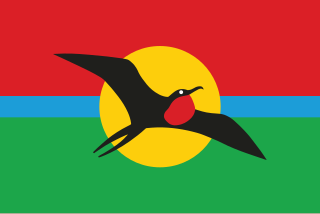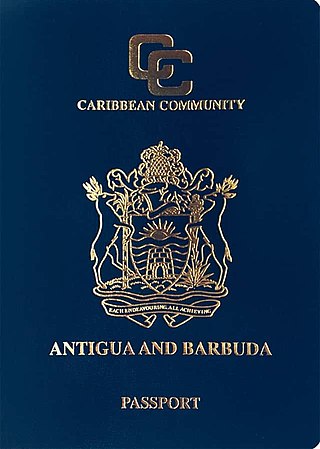Related Research Articles

Antigua and Barbuda is a sovereign archipelagic country composed of Antigua, Barbuda, and numerous other small islands. Antigua and Barbuda has a total area of 440 km2, making it one of the smallest countries in the Caribbean. The country is mostly flat, with the highest points on Antigua being in the Shekerley Mountains and on Barbuda the Highlands. The country has a tropical savanna climate, with pockets of tropical monsoon in Antigua's southwest. Its largest city is St. John's.

The Antigua and Barbuda Defence Force (ABDF) is the armed forces of Antigua and Barbuda. The ABDF has responsibility for several different roles: internal security, prevention of drug smuggling, the protection and support of fishing rights, prevention of marine pollution, search and rescue, ceremonial duties, assistance to government programs, provision of relief during natural disasters, assistance in the maintenance of essential services, and support of the police in maintaining law and order. The force entered its current form on 20 December 1995.

Saint John, officially the Parish of Saint John, is a civil parish of Antigua and Barbuda, on the northwestern portion of Antigua island. Its capital is the city of St. John's. Saint John borders Saint Mary, Saint Peter, Saint George, and Saint Paul. Saint John faces the Caribbean Sea. Saint John is surrounded by some of Antigua's most premier beaches. Saint John had a population of 56,736 in a 2018 estimate, making it home to the majority of the population in Antigua and Barbuda.

The Antigua and Barbuda Regiment is the infantry unit and main fighting arm of the Antigua and Barbuda Defence Force. Previously known as the Rifle Company, it was formed in 1995 and consists of a single light infantry battalion, commanded by a Lieutenant Colonel and made up of four companies:

Antigua, also known as Waladli or Wadadli by the local population, is an island in the Lesser Antilles. It is one of the Leeward Islands in the Caribbean region and the most populous island of the country of Antigua and Barbuda. Antigua and Barbuda became an independent state within the Commonwealth of Nations on 1 November 1981.
The Crossroads Centre is a substance-abuse rehabilitation centre for drug and alcohol addiction located on the Caribbean island of Antigua in Antigua and Barbuda.

The Parliament of Antigua and Barbuda consists of the King of Antigua and Barbuda, the Senate and the House of Representatives.

The Senate is the upper house of the Parliament of Antigua and Barbuda. The Senate and the lower chamber, the House of Representatives, together form the bicameral legislature of Antigua and Barbuda. The Senate and the House together may make laws for "the peace, order and good government of Antigua and Barbuda". Any bill other than a money bill may be introduced in the Senate.

The monarchy of Antigua and Barbuda is a system of government in which a hereditary monarch is the sovereign and head of state of Antigua and Barbuda. The current Antiguan and Barbudan monarch and head of state, since 8 September 2022, is King Charles III. As sovereign, he is the personal embodiment of the Crown of Antigua and Barbuda. Although the person of the sovereign is equally shared with 14 other independent countries within the Commonwealth of Nations, each country's monarchy is separate and legally distinct. As a result, the current monarch is officially titled King of Antigua and Barbuda and, in this capacity, he and other members of the Royal Family undertake public and private functions domestically and abroad as representatives of Antigua and Barbuda. However, the King is the only member of the Royal Family with any constitutional role.

The Barbuda Council is a local authority that manages the internal affairs on the island of Barbuda. The council has the authority to buy, acquire, hold, mortgage, and dispose of land and other property. It also possesses a common seal and perpetual succession. The Barbuda Council, which has the authority outlined in the Barbuda Local Government Act, is the government of the island and its coastal zone. The members of the Senate who meet the requirements outlined in paragraph (1) of section 6 of the Barbuda Local Government Act, nine elected members, and the member of the House of Representatives from the Barbuda constituency make up the Council. A Commonwealth citizen who is eighteen years of age or older, was born in Barbuda, is the child of parents who were at least one of their parents' birthplaces, or who has lived in Barbuda for at least three years prior to the date of their nomination for election, and who is a regular resident of Barbuda and a registered voter under the Representation of the People Act are all required to be eligible to be elected as a member of the Council.

The following outline is provided as an overview of and introduction to Antigua and Barbuda:

Christianity is the dominant religion in Antigua and Barbuda, with Anglicanism being its largest denomination.

Antiguan and Barbudan passports are issued to nationals of Antigua and Barbuda for international travel. The passport is a CARICOM passport as Antigua and Barbuda is a member of the Caribbean Community.

The Royal Police Force of Antigua and Barbuda is the law enforcement agency for Antigua and Barbuda. The Commissioner in 2017 was Atlee Rodney. The force has 350 officers.

Antigua and Barbuda maintains diplomatic relations with the United States, Canada, the United Kingdom, and the People's Republic of China, as well as with many Latin American countries and neighbouring Eastern Caribbean states. It is a member of the United Nations, the Commonwealth of Nations, the Organization of American States, the Organisation of Eastern Caribbean States, the Bolivarian Alliance for the Americas, Petrocaribe and the Eastern Caribbean's Regional Security System (RSS).
The National Security Council of Antigua and Barbuda was established in 2006 by The National Security Council Act of 2006. The council serves as the government's main forum for debating issues pertaining to national security, coordinating the policies and actions of the government's departments and agencies in this area, and carrying out any duties assigned to it by legislation. Establishing priorities among activities that address national security interests and requirements, ensuring the collection and collation of information and intelligence relating to Antigua and Barbuda's national security and the integration of that information and intelligence into the government's domestic, foreign, and security policies, and approving policies for departments and agencies of government to follow in relation to national security are all part of the Council's duties. The Council may also recommend to the Minister related to these policies.
Royal tours of Antigua and Barbuda by its royal family have been taking place since the 20th century. Elizabeth II, Queen of Antigua and Barbuda, visited the country thrice: in 1966, 1977, and 1985.
The national security of Antigua and Barbuda is the collaboration of numerous institutions, including law enforcement, military, paramilitary, governmental, and intelligence agencies that seek to ensure Antigua and Barbuda's national security.
The Joint Intelligence Group (JIG) is the national intelligence community of Antigua and Barbuda. It was established by a memorandum of understanding to streamline the sharing of intelligence through various agencies responsible for the national security of Antigua and Barbuda. Member organisations include various intelligence agencies, law enforcement agencies, and other national security stakeholders.

The Service and Support Unit (SSU) is a branch of the Antigua and Barbuda Defence Force. The unit is responsible for catering services, transportation, military construction, intelligence, and medical support to the rest of the force. The current goal of the unit is to upgrade its sections into platoons.
References
- ↑ "Dion E. Phillips - Antigua and Barbuda Defense Force: A Preliminary Look". global.uwi.edu. Retrieved 2024-11-20.
- ↑ Evaluation Report on Drug Policies: Antigua and Barbuda. OAS. 2022.
- ↑ "Our Partners | ONDCP Antigua and Barbuda" . Retrieved 2025-01-31.